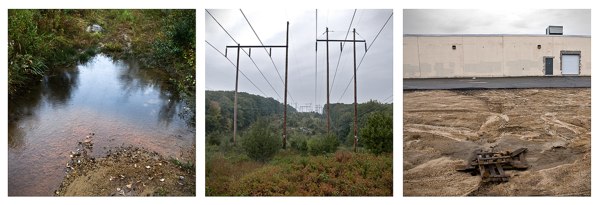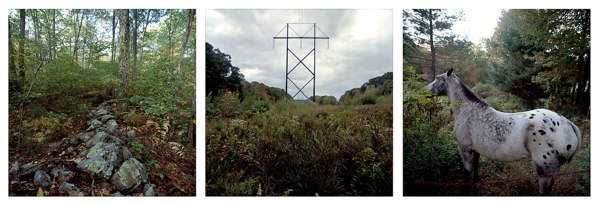In the Category art
the sea level rises and Switzerland becomes a series of islands
Posted October 22nd, 2009 at 12:42 pm. There are 0 comments.
I don’t remember seeing this in particular at the Swiss EXPO.02 but a number of artists working together under the name Waterproof “imagined a(n) (im)possible scenario wherein the water level in Switzerland rises to 1400 meters (4600 feet), turning the landlocked, Alpine country into an island nation, its rocky peaks rising above a vast ocean.”
The series of images over at Pruned show an imaginative take on how the Swiss might deal with their new situation.
via Pruned
birds
Posted July 23rd, 2009 at 5:59 pm. There are 0 comments.![]()
Floral Fauna: Bird Edition by Josh Brill. Prints of 15 different birds in editions of 50. Absolutely beautiful.
variations on incomplete cubes – sol lewitt
Posted July 20th, 2009 at 2:22 pm. There is 1 comment.
Sol Lewitt
I like 8/2 and 10/3
via todayandtomorrow
Francisco Infante-Arana
Posted June 22nd, 2009 at 2:49 pm. There are 0 comments.
Aluminium foil on trees by Francisco Infante-Arana

In a similar vein, Jan Imberi
On the Grid
Posted April 30th, 2009 at 7:17 pm. There are 2 comments.

On the Grid is a project documenting the space created by the vast nationwide network of powerlines and the land underneath them. Undeveloped except for the powerlines them selves they carve through the landscape, connected the most rural with the most urban. The shared space, buzzing with the hum of excess electricity, is at times a pristine and beautiful meadow surrounded by forest and others, the uninhabitable tract amongst suburban banality, beautiful in its own right.
On the Grid, a project by Adam Ryder and Brian Rosa, explores the landscape immediately surrounding high-tension electric transmission lines in Rhode Island. Starting near the Ocean State Power facility in Burnllville, Ryder and Rosa spent several days walking along various sites of this arterial infrastructure. Sites were chosen though surveying publicly available aerial photographs and land use maps, and all photos were geotagged with handheld GPS units. In combining the rigid technical process of digital mapping with the subjective practice of landscape photography, this project explores the state as a collection of differentiated spaces that, though seemingly isolated, are networked.
The resulting photographs showcase the topographical diversity surrounding these structures, whose own narrow terrain remains virtually unchanged throughout their straight, incisive paths. The path of the power lines functions as a rural to urban transect, cutting through farmland and commercial parks, cul-de-sacs and strip malls, used car lots and interstate highways.
As human intervention in the natural landscape sprawls to the most remote areas of the state, our lived space becomes increasingly regulated and our encounters with equivocal territories are especially rare. In more urbanized areas, we lose our relation to places which seem to exist unto themselves, where one can feel alone and unhindered. The ambiguity of the land occupied by high-tension power offers the possibility of experience outside of regulation. Despite being part of an infrastructure that is highly regulated and bureaucratized, the physical space inhabited by these power lines remains easily accessible though its sheer ubiquity. Thus, paradoxically, the realm of power lines seems to exist not only outside of regulation, but also outside of the normative properties of the native landscape. Whereas an area half of a mile away from a high tension line may be densely wooded, the space occupied by the wires will be clear-cut, devoid of trees and exhibiting, at most, low shrubbery and grass. The uniformity of this narrow swath as it cuts through the landscape reveals as much about its own spatial utility as it does of the landscape it bifurcates across the state (and beyond). It is this topographical sameness that makes the power lines amazing sites of contrast against both development and the natural landscape.
On the Grid invites reflection on the blurred relationship between networked technology, the built environment and nature through these buzzing monoliths.
– Website Text (An image on the original website)
They did a nice interview on the NPR show Living on Earth (mp3 link).
Quoting here,
Yeah absolutely, it’s a really unique tract of land that doesn’t have any development on it except for itself. So, it’s kind of, in a way its really pristine and untouched and…virginal, its kind of, kind of like, romantic and magical in that way.
-Adam Ryder
and
What’s really – I think actually awesome, is the best word I can use to say it – what’s really awesome about seeing this parade of power lines through the landscape, especially in rural areas is that we’re kind of seeing these, these tendrils connecting humanity as one large organism and it’s a cool way of looking at us, you know what I mean?
-Adam Ryder
Locate powerline grid infrastructure near you via this previous post
sky, free of charge
Posted April 30th, 2009 at 3:15 pm. There are 0 comments.
Sand Ocean Sky Available 7 Days Free of Charge – Steve Lambert
paint spill
Posted April 13th, 2009 at 2:23 pm. There are 0 comments.
Paint Spill, 2009
Do Not Touch (counterbalanced shelves) fallen down. A can of floor paint used to counter balance one of the shelves burst open and spilt its content on the gallery floor that had recently been painted with the same paint.

Do Not Touch, 2008
tara donovan
Posted April 8th, 2009 at 7:05 am. There are 0 comments.

Untitled, 2003
Styrofoam Cups, Hot Glue
6′(H) x 20′(W) x 19′ 2″(D)
Ace Gallery New York
Tara Donovan creates large installations with common manufactured materials
everything i have
Posted March 16th, 2009 at 5:03 pm. There are 0 comments.
Simon Evan’s work is at James Cohan Gallery in New York City, until April 4th.
Jan Imberi
Posted March 11th, 2009 at 10:40 pm. There are 0 comments.
Wonderful and large scale, this installation / photograph is the creation of a super flattened space. Seems to be in the tradition of John Pfahl’s Altered Landscapes and Jan Dibbets’s Perspective Corrections.
[ iamtheweather powered by Wordpress And is definitely Not Plastic Bag ]
